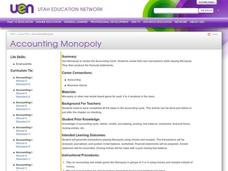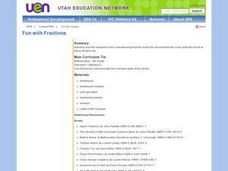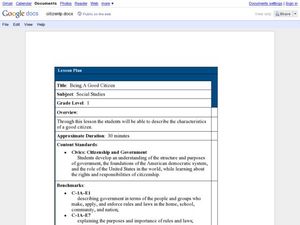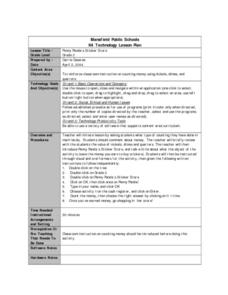Curated OER
Accounting Monopoly
Students use Monopoly to review the accounting cycle. They create their own transactions while playing Monopoly. Students produce the financial statements that will match the transactions of the game.
Curated OER
TECH:Introduction to Programming (IT)
Students complete an activity that illustrates the concepts of giving accurate instructions and computer programming. They also identify the relationship of the instructions/code to computer programming. Students then create a peanut...
Curated OER
Stirring up Fractions
Second graders practice unit fractions to identify parts of the whole and parts of a set. They utilize a variety of manipulative's including recipe boxes to get them started stirring up fractions. A multitude of books on fractions are...
Curated OER
New: Fun with Fractions
Third graders determine that the larger the denominator the more parts the whole is being divided into. They use fractions to communicate and compare parts of the whole. They discover what the numerator and denominator of a fraction...
Curated OER
Subtraction-There's Got to be An Easier Way!
Third graders observe and demonstrate a variety of problems involving subtraction problems using mental math strategies. They discuss the base ten system and the basic concept of subtraction, and complete a variety of activities...
Curated OER
Midpoint of a Segment
Learners revisit midpoint and segments by graphing on the TI or computer. This activity can be done with pencil and paper, but is more interactive if it is done on a TI-navigator.
Curated OER
Intersecting Lines and Vertical Angles
Pupils identify and define intersecting lines and vertical angles. They draw two intersecting lines and measure one pair of vertical angles. Learners will also move a line to change the angles of a figure and describe the changes in the...
Texas Instruments
Investigating Segments in a Quadrilateral
Investigate the properties of the shape formed by connecting the midpoints of adjacent sides of a quadrilateral. In this properties of the shape formed by connecting the midpoints of adjacent sides of a quadrilateral lesson, students use...
Curated OER
Exploring the Orthocenter of a Triangle
Young mathematicians explore the concept of triangles as they construct altitudes of triangles to find the orthocenter. Learners construct their triangles using Cabri Jr. on their graphing calculators and find that the altitudes of a...
Utah Education Network (UEN)
Order of Operations Treasure Hunt
In this algebra lesson, students work in groups to design a treasure map in which algebraic equations must be solved using the correct order of operations. Students decide where treasure is hidden, then create and follow their group's...
Curated OER
Probability
Students explore probability. In this probability lesson, students define theoretical probability and experimental probability. Students predict outcomes of hands on activities using coins and colored tiles, complete a chart...
Curated OER
Spinning Probability
Sixth graders study the concept of probability. In this probability lesson, 6th graders create spinners that match specific sets of clues. Students use their spinners and worksheets to explore and predict probability.
Curated OER
Balancing Equations and Using a Pyramid
Sixth graders complete worksheets and make journal entries to interpret mathematical expressions about the pyramids. In this equality by balancing equations instructional activity, 6th graders participate in groups or by themselves to...
Curated OER
Being a Good Citizen
First graders discuss citizenship. In this being a good citizen lesson, 1st graders complete a worksheet identifying characteristics of a good citizen. Students draw a picture then use a flip camera to capture good classroom citizens.
Curated OER
Local Linearity
In order to investigate local linearity, students graph the function on the TI-calculator and zoom to observe the change in slope on the line. They incorporate technology to visualize these problems.
Curated OER
Preserve is the Word
Students investigate a list of archaeological ethical questions. They select a question/issue and design a 3-minute (maximum) PSA to persuade the public to agree with their idea. They conduct research or interviews with experts to be...
Curated OER
Public Speaking
Learners examine how can technology be used as an asset in public speaking. They develop their public speaking skills through the use of a PowerPoint presentation and integrate animation into their presentation.
Curated OER
Math and Architecture Lesson
Students examine relationship between architecture and math, explore importance of inventions to humanity and relate math and architecture to their school and home by creating graphs, tables, and presentations showing development of...
Curated OER
Penny Panda's Sticker Store
Second graders practice counting money using nickels, dimes, and quarters. They review the value of nickels, dimes and quarters. They explore Penny Panda's Sticker Store, and talk a little about what the object of the activity is (save...
Curated OER
Cell Discoveries
Students observe, compare and describe cell organelles in terms of their function, structure and operation. They enter and edit information in a database, build and sort a student-designed database and find records in a database.
Curated OER
Earthquake Epicenter
Students use chart data to determine the location of the epicenter of an earthquake. This task assesses students' abilities to generalize and infer, organize data, interpret data, and apply mathematical concepts.
Curated OER
Brick Memorial Flyer
Students conduct research using the internet, school server and newspapers on the history of the brick memorial for veterans and its developmental process. They create and design a three column page layout for a brochure using Microsoft...
Curated OER
State Symbols of Michigan
Students study the symbols of the state of Michigan and create a slide show using KidPix. They discuss the diversity of creation within the state of Michigan. Students also discuss how God is in control of the "kings of our earth."
Curated OER
Comparing/Ordering Numbers
Third graders compare numbers. In this math lesson students compare ones, tens, and hundreds. They also order numbers from least to greatest and from greatest to least.

























